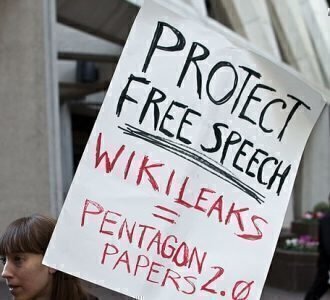One of the current debates in Washington is over disclosures reported by the New York Times and other publishers of U.S. government intelligence related to alleged Russian involvement in the recent presidential election. The allegations are sourced to U.S. government officials who spoke about classified information to the American press about conversations among Russian officials that were intercepted by U.S. intelligence agencies. The New York Times said in its reporting that its sources spoke on conditions of anonymity since the government investigation was on-going.

Photo Credit: Creative Commons, Max Braun
On Wednesday, President Donald Trump was critical of the intelligence agencies and the press on his Twitter account. “Information is being illegally given to the failing @nytimes & @washingtonpost by the intelligence community (NSA and FBI?).Just like Russia,” Trump said on Twitter. “The real scandal here is that classified information is illegally given out by ‘intelligence’ like candy. Very un-American!”
So far, the Trump administration hasn’t said how it will deal with the leaks of classified information to the press. But Senator Ron Johnson, a Republican from Wisconsin, told the Washington Post it was a serious matter. “Leaks of this nature are incredibly damaging to America, to our national security, and we need to look into it,” Johnson said.
In prior administrations, the federal government has gone after people who leaked the information to the press and not the outlets that published it.
The legal protections for publishers who release classified information, but who aren’t directly involved in illegally obtaining the same information, are based on a series of Supreme Court decisions. In New York Times v. United States (1971), the Court in a 6-3 decision ruled that the First Amendment protected the newspaper’s right to publish the Pentagon Papers, government documents about the Vietnam War illegally obtained by a private individual and published in the New York Times and Washington Post.
“To find that the President has 'inherent power' to halt the publication of news ... would wipe out the First Amendment and destroy the fundamental liberty and security of the very people the Government hopes to make 'secure,’” said Justice Hugo Black. “The word 'security' is a broad, vague generality whose contours should not be invoked to abrogate the fundamental law embodied in the First Amendment.”
However, Daniel Ellsberg, who leaked the Pentagon Papers to the press after illegally obtaining them, was charged with six counts of espionage, six for theft, and one for conspiracy. Although his prosecution ultimately ended in a mistrial due to government misconduct, it was clear that Court didn’t believe the First Amendment excused illegal activity, even if it furthered a journalistic interest.
In another case, the Court said in Bartnicki v. Vopper (2001) that a radio commentator who broadcast a phone conversation illegally obtained by another person was protected by the First Amendment. The phone conversation was about public school union negotiations and potential violence related to them. Writing for the majority, Justice John Paul Stevens said, “a stranger's illegal conduct does not suffice to remove the First Amendment shield from speech about a matter of public concern.”
While the press may enjoy a broad protection against prosecution for publishing third-party content, the people who are found to be the leakers don’t. For example, former NSA contractor Edward Snowden was charged with two crimes under the Espionage Act for stealing classified information and passing it on to publishers. Today, he is staying in Russia living in virtual exile. In 2013, former Army private Chelsea Manning was sentenced to 35 years for giving more than 700,000 documents to Wikileaks. (Manning’s sentence was later commuted by President Barack Obama.)
Reporters who also publish classified information may also be compelled by a court to reveal their sources based on the location of the court action, especially if the case is in the federal court system.
In the Supreme Court’s Branzburg v. Hayes decision from 1972, the Court found that “the First Amendment does not relieve a newspaper reporter of the obligation that all citizens have to respond to a grand jury subpoena and answer questions relevant to a criminal investigation, and therefore the Amendment does not afford him a constitutional testimonial privilege for an agreement he makes to conceal facts relevant to a grand jury's investigation of a crime or to conceal the criminal conduct of his source or evidence.” The Branzburg decision did allow for states to pass their own shield laws to protect reporters from revealing sources; a federal shield law doesn’t exist.
In a high-profile case, former New York Times reporter Judith Miller spent about three months in jail in 2005 after she refused to reveal a source of a White House leak and was found in contempt by a federal judge.
And journalists who actively take part in an illegal activity to acquire information don’t usually enjoy legal protections. In 1999, the U.S. Court of Appeals for the Fourth Circuit found that ABC reporters who applied for jobs at a grocery chain to investigate food safety violations were guilty of trespassing. The Fourth Circuit said that even though the publication of the story was in the public interest, the press “has no special immunity from the application of general laws.”
Scott Bomboy is editor in chief of the National Constitution Center. This article also contains material from Jonathan Stahl.







